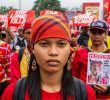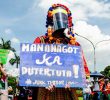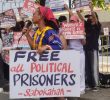By CJ KUIZON | Davao Today
Sitio Valma of Barangay Ngan in the municipality of Compostela used to be a thriving logging community in the 1970s up to the 1990s.
When the company’s timber logging agreement (TLA) expired, Consuelo Valderrama, its owner, chose not to renew the contract, signalling the death of the boom town.
The hospital and the extension campus of the Ateneo de Davao elementary in the community closed down, the buildings that used to serve as dormitories for the old school’s faculty and for the special visitors of the Valderramas crumbled, but the Valderramas allowed the community to live rent-free on their land.
Valderrama passed the TLA on to the residents who put up a cooperative and continued to rely on logging as their principal source of income.
But this year, a different set of visitors arrived in the community.
Jun Alcos, the barangay captain of Poblacion, said the 28th infantry battalion of the Armed Forces of the Philippines had camped in one of the puroks in May without informing him beforehand.

Davao Today took this picture during the visit to Valderama compound in Compostela town of Compostela Valley to confirm reports of military encampment. The building behind the tanks is the community-based cooperative. The makeshift structures on the left are government soldiers’ bunks. Beyond that is the Compostela National School – T. H. Valderrama Annex. These vehicles are parked in the school playground. (davaotoday.com photo by Jonald Mahinay)
Alcos, who found out about it later, said this encampment is not allowed by law.
Section 22, paragraph e of Article 10 of Republic Act 7610, also known as the Child Protection Act, prohibits the military from using public infrastructure, specifically schools, hospitals and rural health units as command posts, barracks, detachments, and supply depots.
The International Humanitarian Law (IHL) also ensures that civilian population shall be protected against risks and dangers posed by the presence of military camps in urban centers and other populated areas. The IHL, which contains the “rules of war” and “laws governing armed conflict,” reflects the universal principles set in international treaties or conventions signed by states of the world, including the Geneva convention of 1949 and its additional protocols of 1977.
Alcos said he had confronted Major Jesem, the highest ranking official in the brigade, about it but Jesem told him that if the community did not want their presence, the people should come up with a petition, and the soldiers would immediately leave.
So, the barangay council passed a resolution petitioning the military to leave but wary of possible repercussions, the villagers refused to sign.
Alcos said a lot of Valma residents were happy because the presence of soldiers meant additional income for carinderia owners and habal-habal drivers.
But residents told Davao Today a different story.










